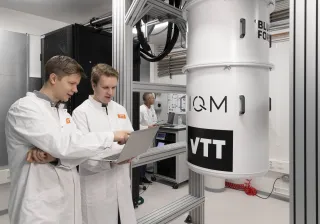This week, Telia successfully tested the ultra-secure quantum encryption technology in its network in Helsinki as the first commercial operator in Finland. The demo is a significant step in a national project which aims to build a quantum secure network for Finland.
Quantum key distribution, or QKD, is a new method based on quantum mechanics that enables extremely secure communications. The Finnish project is part of the EU’s EuroQCI initiative, which strives to create a quantum encrypted network covering the whole of the EU by the end of the current decade, particularly to protect critical infrastructure.
In Finland, VTT is leading the national quantum secure network NaQCI.fi together with CSC – IT Centre for Science, Cinia Oy and Suomen Erillisverkot Oy. The test carried out by Telia is part of the first phase, in which a public test network is being built in the Helsinki metropolitan area. Similar test networks are planned for all EU countries.
“Telia’s demo is a significant step towards building a quantum secure network for Finland and its wider utilisation in businesses and organisations. Now, we were able to assess how this new and demanding technology functions in a commercial operator’s network. We gained hands-on experience about the features and challenges posed by an operator network regarding the implementation of quantum encryption”, says VTT’s Senior Scientist Kari Seppänen.
In the demo, Telia used its Helsinki data centre's audited network environment and facilities. The company also provided human resources and the resources of the existing network.
“As an operator, it is important for us to participate in a project that serves both Finland's national security needs and the business need to protect critical data vital for operational security, in particular. Without experimenting we can’t know what quantum key distribution over the operator network requires. We see that our role is to act as an essential intermediary to make projects developing secure solutions a reality”, says Tero Maaniemi, Lead Architect of Telia’s network infrastructure.
Quantum encryption equipment outside a laboratory for the first time
VTT and CSC have jointly acquired the equipment required for establishing quantum encrypted QKD communications, which had been tested earlier only in laboratory settings. VTT has also performed its own research about implementing quantum communications and developed its own solutions to ensure data security.
“The main technical challenge of the quantum encrypted network lies in the fact that the equipment is still more at the prototype stage than fully ready for production environments. Therefore, this initial experience gained in Telia’s demo teaches us how QKD encryption functions outside a test laboratory in Finland. It was especially valuable to see where there is still room for improvement considering a wider implementation of the technology,” says Mikael Johansson, manager of quantum technologies at CSC.
Quantum encryption networks provide a way to preemptively counter the future ability of quantum computers to efficiently break the encryption currently used in data communications. It is possible for attackers to record the data traffic of their chosen target already now and wait for the moment when the encryption can be broken.
Another preemptive method alongside QKD is PQC encryption algorithms (post quantum cryptography), which withstand quantum computing. These have been developed to replace current encryption algorithms with quantum secure alternatives. For instance, new PQC connections are already being used between CSC’s data centres.
“Quantum secure communications with QKD, PQC, or their combination is important for Finland so that we can communicate securely without fear of our current messages being decrypted in the future. Adding quantum encryption for the most important connections can also create new business opportunities since it supports, for instance, the processing of sensitive information in data centres located in Finland,” Johansson says.
Outside the EU, British Telecom, for example, has built a quantum encrypted trial network in London to serve the banking industry. In South Korea, the state administration uses a quantum secure communications network stretching over 800 kilometres.
Quantum key distribution is also the first step towards a quantum internet, which enables future quantum computers to connect with each other, further increasing the efficiency of quantum computing.






